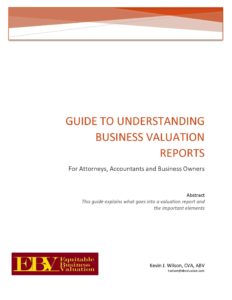How Business Valuation Can Help In Planning An Exit Strategy
There are numerous reasons why business owners need an exit strategy – the most common being a planned retirement, a new business opportunity arises or for unforeseen health or financial matters. In any event, when business owners are thinking or planning to move on they would, of course, seek to maximize the value they’ve created.…
Read More Guide to Understanding Business Valuation Reports – For Attorneys, Accountants and Business Owners
Introduction: Attorneys, accountants and business owners frequently retain business valuation specialists to value a business or an ownership interest in a business. The purpose of the valuation can be for any number of reasons such as equitable distribution in a divorce, buy-out of a partner interest, estate and gift tax planning, shareholder dispute, among other…
Read More Standards of Value in Business Valuations – Fair Market Value, Fair Value, Investment Value: What’s the Difference?
When attorneys and consultants encounter instances when their client needs a business valuation, most likely they hear the terms Fair Market Value, Fair Value and Investment Value bandied about interchangeably. But what do these terms actually mean? They do have different definitions and this article sheds some light on what they mean and their application.…
Read More Buy-Sell Agreements – What you need to know to avoid purchase price conflicts
The following is an article published in the July/August 2017 issue of The Pennsylvania Lawyer written by Kevin J. Wilson, CVA, ABV Attorneys and most experienced business owners know the importance of buy-sell agreements and the critical role they play in facilitating the transfer of a business interest if and when a certain event occurs.…
Read More Valuation Engagement vs. Calculation Engagement in Business Valuations – What’s the Difference?
When hiring a valuation specialist to estimate the value of a company or interest in a Company, there are two types of engagement formats you need to be aware of. Under the AICPA’s Statement on Standards for Valuation Services No. 1 (SSVS No.1), the two types of engagements are a valuation engagement and a calculation…
Read More Pitfalls In Relying On Rules Of Thumb To Value A Business
Don’t Get Caught in the Rule of Thumb Trap In determining the value of a small privately-held business, business owners and buyers of businesses often rely on rules of thumb pricing multiples. Using rules of thumb is considered a “market approach” in valuing a business since the multiples are based on actual sales of businesses.…
Read More 





